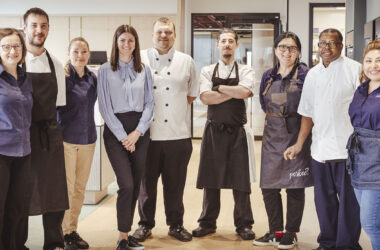Expert Guides
The spread of the COVID-19 corona-virus continues to dominate our lives. We are monitoring developments from a ‘business continuity’ perspective. We have put appropriate measures in place to ensure that bartlett mitchell is prepared including writing this guide to cater safely during coronavirus.
In respect of COVID-19, we are focused on the health and welfare of our teams, customers and clients whilst continuing to provide outstanding workplace catering services. This expert guide includes the specific actions we have taken, best practice and additional recommendations.
Prior preparation
A robust approach to risk management and operational effectiveness is integral to our business. We are prepared for unexpected events through the bartlett mitchell BCP (Business Continuity Plan). Our BCP identifies the requirements for each area of the business to function under a wide range of scenarios. It is under constant review. Scenarios include major sickness outbreaks such as COVID-19.
We have invested in technology and infrastructure including Yapster. These ensure that the business is both robust and adaptable to cope with these significant and disruptive events.
We are monitoring and implementing official guidelines from Public Health England with regard to COVID-19 so that we can continue to cater safely during coronavirus.
Actions already taken at site
- We are only providing grab and go, takeaway and delivery in line with Statutory Instrument 2020 No 327.
- All seating areas are now closed and we are asking customers to queue at 2 metre ‘social distancing’ intervals.
- We continue to embrace original Government advice – where team members (or a family member) who have travelled within the last 14 days to a PHE Category 1 country stay at home in self-isolation for 14 days (tracked confidentially – GDPR compliant).
- Team members with a new, continuous cough or a high temperature were historically advised to self-isolate for 7 days which has now been enhanced to 14 days and includes self-isolation for all individuals living in the same household (tracked confidentially – GDPR compliant).
- We are asking team members to identify all countries they have visited whilst on leave (this information is held confidentially – GDPR compliant).
- Provided COVID-19 Manager app with information and resources for all team members.
- Hand sanitisers and tissues are widely available throughout all our contracts for both team members and customers.
- Continually communicate the safe hand washing procedure tou0026lt;span class=u0026quot;Apple-converted-spaceu0026quot;u0026gt; u0026lt;/spanu0026gt;team members using all our communication channels
- Mandatory wearing of blue vinyl gloves for catering teams.
- Implemented supply chain COVID-19 surveys and response audit.
- In our office spaces we have reinforced our clear desktop policy to facilitate additional deep cleaning.
- Where it’s possible we have ensured that team members are able to work from home and we have the technology in place to facilitate this.
- We have succesfully tested the partial closure of our support office for a limited period. In the event government advice recommends all workplace closures we would be ready to respond immediately.
- Meetings and visits to site will only take place if absolutely necessary.
- Requested that our team members to reduce business and personal travel to a minimum.
- We recognise that many clients will also want to minimise their travel and face-to-face contact during this period. Therefore we can facilitate meetings by phone and video-conferencing.
- Encouraging all team members to use our collaborative platforms such as Yammer and Yapster to communicate and access information.
- Sanitiser and vinyl gloves are available on service counters for customers to use as required.
- Team members must wear gloves to move delivery items -u0026lt;span class=u0026quot;Apple-converted-spaceu0026quot;u0026gt; u0026lt;/spanu0026gt;cages, boxes, packaging etc.
- Supplieru0026#039;s delivery drivers have been instructed to wear gloves.
Best practice for catering safely during coronavirus
Modify greetings; say no to a handshake, give up high fives, refuse kisses on the cheek and definitely avoid hugging. Change habits at work and at home to reduce the risk of contracting the coronavirus and prevent it from spreading.
Stop using communal condiments (pepper and salt) for now.
Switch all sites to CV-19 and essential safety audits only.
Audit all commercial dishwasher water temperatures to ensure the rinse cycle reaches 82oc to destroy harmful bacteria and reduce the risk of contamination. This is a regular check and is recorded in compliance diaries every week.
Postpone road-shows and non-essential visits to sites.
Switch to electronic reporting and virtual contract meetings.
Stop using external catering agency staff to remove the risk of introducing the infection.
Use only fruit with removable skin e.g. bananas and oranges etc. for free-issue.
Make it mandatory in tea points for dishwashers rather than hand washing to be used for cleaning mugs and cutlery etc.
Advisory notes on water filling stations suggesting customers avoid ‘nozzle contact’.
Switch face to face customer feedback sessions to online surveys.
Provide visible extra sanitation of dining areas.
We have placed covers on all display items including cakes and pastries on coffee bars.
Further recommendations
These may require client approval due to potential cost and environmental impact.
- Temporarily revert to paper coffee cups instead of ‘reusable-cups’.
- Encourage more cashless payments and less cash handling.
- Place anti-bacterial gel in all meeting rooms.
- Discourage ‘hot-desking’.
- Encourage team members to use anti-bacterial wipes to regularly clean their work devices; mobile phones, tablets, keyboards, desk-phones, headsets and workspaces.
- Replace all self-serve options with served offers. e.g. salad bars sell boxed salads, hot counters, soup stations etc. This is to prevent sharing service utensils and contamination.
- Serve dressings in individual portions and a new spoon per serving for jams and butters etc.
- Switch all communal or sharing hospitality to individual portions e.g. sandwich platters, cookie plates and dips.
- Stagger customer lunch-times so peak times are flattened to reduce congregation.
- Change either campus or segregated floors to a trolley delivery service.
- Reception team should sanitise visitor badges or temporarily replace with single use badges.
- Consider implementing rotating shift patterns; teams A and B. Team A in office one week, deep clean at the weekend. Team B take over whilst team A are working from home.
- Consider use of protective surgical face masks.
- Use taxis for all on-site employees (to avoid using public transport).
- Carry out tabletop disaster recovery planning for both partial and full execution. Follow this up with planned live testing.
- Stress test finances using forecast and cash flow modelling.
Temporary restaurant closure
If a client has decided to temporarily close their building, we have devised a comprehensive shut-down procedure comprising;
- Carry out a stock take.
- Cancel any food orders.
- During end of service cleanse, take extra care to ensure all surfaces and floors are clean and free of any debris.
- Investigate if catering staff can support client’s FM team with tasks like vending replenishment and cleaning.
- Food that is likely to go out of date prior to reopening must be transferred, discarded or donated.
We are donating our surplus food to London City Harvest and The Felix Project. They deliver to charities and schools who provide healthy meals to help the most vulnerable in society.
Communication
Using internal communication channels and cascading messages through line managers is critical to cater safely during coronavirus. Our technology app – Yapster is proving effective for this. In this fast-moving situation team members and clients value the reassurance it can provide.
We are committed to supporting our clients so that catering runs as smoothly as possible with a minimum of fuss and inconvenience. As the coronavirus situation evolves we will update this expert guide in line with government advice.
Further information from official websites
www.gov.uk/government/collections/wuhan-novel-coronavirus#history
www.gov.uk/government/collections/coronavirus-covid-19-list-of-guidance




